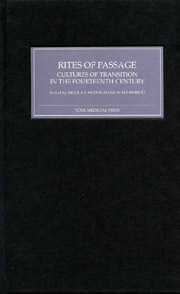Book contents
- Frontmatter
- Contents
- List of Contributors
- Preface
- Introduction: Rites of Passage
- Re-writing a Rite of Passage: The Peculiar Funeral of Edward II
- Coming to Kingship: Boy Kings and the Passage to Power in Fourteenth-Century England
- Boy/Man into Clerk/Priest: The Making of the Late Medieval Clergy
- Manners Maketh Man: Living, Dining and Becoming a Man in the Later Middle Ages
- Rites of Passage in French and English Romances
- Becoming Woman in Chaucer: ‘On ne naît pas femme, on le meurt’
- John Gower's Fear of Flying: Transitional Masculinities in the Confessio Amantis
- ‘Le moment de conclure’: Initiation as Retrospection in Froissart's Dits amoureux
- Index
- YORK MEDIEVAL PRESS: PUBLICATIONS
‘Le moment de conclure’: Initiation as Retrospection in Froissart's Dits amoureux
Published online by Cambridge University Press: 12 September 2012
- Frontmatter
- Contents
- List of Contributors
- Preface
- Introduction: Rites of Passage
- Re-writing a Rite of Passage: The Peculiar Funeral of Edward II
- Coming to Kingship: Boy Kings and the Passage to Power in Fourteenth-Century England
- Boy/Man into Clerk/Priest: The Making of the Late Medieval Clergy
- Manners Maketh Man: Living, Dining and Becoming a Man in the Later Middle Ages
- Rites of Passage in French and English Romances
- Becoming Woman in Chaucer: ‘On ne naît pas femme, on le meurt’
- John Gower's Fear of Flying: Transitional Masculinities in the Confessio Amantis
- ‘Le moment de conclure’: Initiation as Retrospection in Froissart's Dits amoureux
- Index
- YORK MEDIEVAL PRESS: PUBLICATIONS
Summary
This essay is concerned with initiation not as outward rites but as inner change. What does it mean to be initiated? Using dits amoureux by the fourteenthcentury French poet Froissart I will argue that, from the point of view of the initiate, the fact of initiation is lost between the events that lead up to it and the retrospective awareness of it that follows. Initiation is thus experienced only as something that has already taken place. The short answer to my own question, then, is that being initiated means recognizing that one has been initiated. This account might be described as a ‘phenomenology’ of initiation were it not that the approach I shall be taking relies on psychoanalysis, and thus on unconscious processes. This essay thereby runs counter to the anthropological approaches adopted by some other contributors to this volume. Indeed, I shall be arguing that the logic which leads to recognizing oneself as having been initiated involves a certain collaborative misapprehension, a contention which may further deepen the rift with anthropology. Although focusing on love poetry, the argument outlined here has implications for political experience and for philosophical questions (such as the nature of memory), to which I return in my concluding section. Indeed, in their widest repercussions, the ideas advanced in this essay may affect the way we conceive our relationship to the past, and thus be relevant to historical preoccupations more generally.
- Type
- Chapter
- Information
- Rites of PassageCultures of Transition in the Fourteenth Century, pp. 153 - 172Publisher: Boydell & BrewerPrint publication year: 2004



